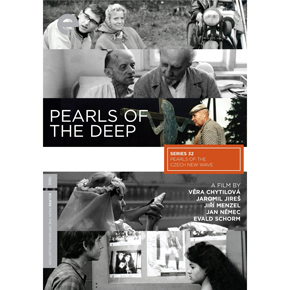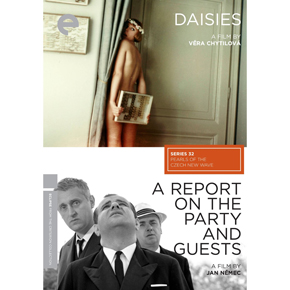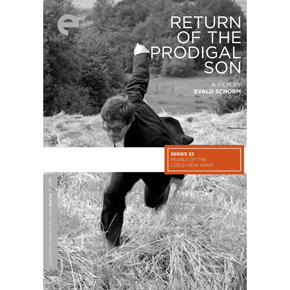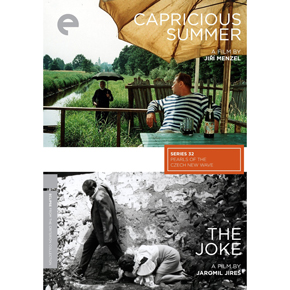
 |
|
|
|
Eclipse's new DVD series Pearls of the Czech New Wave presents a choice selection of films made by some of the most courageous directors in film history. Seemingly innocuous and apolitical movies are among those denounced by the Czech Communists, whereas others take a more defiant stance against the restrictions imposed by official censorship. Between Michael Koresky's informative notes on this new Eclipse collection, and earlier writings by the late Amos Vogel, we begin to better understand the situation in 1960s Czechoslovakia. When Alexander Dubček became the First Secretary and President, the liberalization of Czechoslovakia became official policy. Greater freedom in journalism and the arts culminated in the Prague Spring of 1968. The move toward more civil liberties was soon stopped when Soviet tanks entered Prague in August. The state-run film school FAMU had long allowed students access to foreign films banned to the general public, and many Czech productions suppressed by the state domestically were still exported to festivals outside the country. The "New Wave" pictures most often found disfavor with the Communist censors not for opposing the government in any direct way, but because they deviated from the approved standards of Socialist Realism. The purpose of government-supported art (the only acceptable art in a totalitarian state) is to advance The Revolution, "to further the goals of socialism and communism". Thus a typical Socialist Realist film shows ordinary people discovering or acknowledging that their work and suffering contributes to the ultimate social good. A typical approved character gives his all for the benefit of his comrades, and then refuses to take a personal reward. Everything is for the group, not the individual; commitment to the ultimate victory of Communism heals all psychic wounds and makes personal issues secondary. Characters that act in self-interest are invariably avaricious and anti-social. 
It goes without saying that the strictures of Socialist Realism don't leave much room for exploring the nuances of human behavior. The majority of the films gathered for Pearls of the Czech New Wave aren't overtly anti-Communist. Some revel in nonsense fantasy and visual excess, delighting in the sheer liberation of breaking the rules. Others simply allow characters to be people, without carrying the responsibility of promoting an abstract (and demonstrably inhuman) social ideology. Some of the films saw local distribution before being withdrawn from public view while others were banned almost on release and withheld for decades. After the short-lived triumph of the Prague Spring, certain of the New Wave filmmakers decided to leave the country. Others either stopped working or redirected themselves to projects condoned by the new and harsher regime. The anthology film Pearls of the Deep (Perlicky na dne, 1966) sees five New Wave directors taking on short stories by the author Bohumil Hrabal. Each quirky chapter has a distinctive personality and none are the least interested in being socially responsible. Mr. Balthazar's Death is a bit of black comedy by Jiří Menzel, whose big hit in the West is Closely Watched Trains. Several fans of motorcycle racing entertain themselves at a rally with stories of old crashes, while waiting for new accidents. Jan Němec's The Impostors sees two old men in a hospice, a singer and a journalist, recall their earlier successes. Author Hrabal has a small part in each episode; here he delivers the surprise finish. The omnibus pops to color for Evald Schorm's odd comedy The House of Joy, which features the same primitive artist that served as the inspiration for author Hrabal's short story. An eccentric artist and his equally odd mother constantly decorate their roadside shack. They eventually erect a tin image of a crucified Christ that causes a traffic accident. The sole female director in the group is the provocative Věra Chytilová. Her The Restaurant The World is a perplexing, endlessly interpretable picture puzzle about a eatery closed on account of an odd death in the back room. A bride left alone on her wedding night is at a loss -- she doesn't want to sleep by herself, even if her new husband is in jail. Director Jaromil Jires' final chapter Romance covers the strange encounter of a young plumber's assistant with a teenaged gypsy girl, who at first wants cash but then decides that her conquest is the man of her dreams. A social angle comes in when she takes her new beau back to the gypsy camp. 
The best-known title in the Eclipse set is Věra Chytilová's Daisies (Sedmikrásky, 1966), a nonsensical barrage of chaotic imagery clearly designed to outrage literal-minded viewers. Surreal, irrational, it defies any attempt at categorization. Two manic beauties romp about for the entire length of the picture, leaping from one brightly colored setting to the next. Some passages suggest a hint of reality, only to be undercut by unpredictable jumps to new absurdities. Like a moving collage, the girls' costumes change as often as the backgrounds, as they overdose on sensations and pleasures. Food fights figure significantly, as do alarming references to blades and cutting. At one point the irresponsible women are plastered with newspapers, like newsprint mummies. In another sequence rudimentary camera effects make them appear to disassemble their bodies. Film historian and theoretician Amos Vogel reported that Jan Němec's A Report on the Party and Guests (O slavnosti a hostech, 1966) won a Critic's Prize while simultaneously earning the special censorship status of being "banned forever". A sinister piece of Kafkaesque menace, the story concerns several picnicking couples preparing to join a party in the country. Confronted by a larger number of well-dressed men, they are forcibly herded into a clearing and made to withstand a bafflingly unclear, humiliating treatment by an inquisitor. The wealthy party-giver then appears, berates the inquisitor and invites the newcomers to join his celebration tables by a pond -- where his attitude becomes no less intimidating. When one guest disappears without warning, the host laughs it off. But the inquisitor is soon organizing a "friendly" expedition to bring the absent guest back -- with dogs and guns. A witheringly apt allegory for the Czech regime, Report frightens because it depicts how easily a comfortable class will cooperate and collaborate with openly hostile self-elected authorities. The cast is composed of professional artists. Composer Jan Klusák plays the offensive inquisitor, and directors Jan Němec and Evald Schorm take major roles. Němec earned the personal attention of Dubček's predecessor, when he was named the "greatest danger to the establishment." 
Evald Schorm's Return of the Prodigal Son (Návrat ztraceného syna, 1967) charts the therapeutic non-progress of an architect, happily married and with a small child, who attempts suicide. He grows distant from his wife to the point that she takes a lover. He cooperates fully with his doctor but also goes AWOL from the clinic, as if trying to meet new people and start a new life. An added complication is the doctor's frustrated wife, who would like to have an affair with him. Roaming out on his own, frightened locals mistake him for a wanted murderer. Our hero seems depressed by the state of his life -- even his employer talks vaguely about the necessity of making compromises. Director Schorm is frequently compared to Italy's Michelangelo Antonioni; Prodigal Son begins and ends with 'architectural' montages of buildings, similar to Antonioni's The Eclipse. Jiří Menzel's Capricious Summer (Rozmarné léto, 1968) is from a book by an honored Communist martyr executed with hundreds of other hostages in the wake of the assassination of the Nazi Hangman, Heydrich. Yet the Menzel's insistence on embracing the personal over the communal goes against official policy. Like the director's international hit Closely Watched Trains, Capricious Summer sets its story at a safe distance in the past, the relatively peaceful 1920s. Three amusing middle-aged men, one of them a minister, pass a summer swimming at a bath house on the river. Excitement comes into their lives with the arrival of a traveling magician, whose beautiful assistant takes up with each of them in turn. Filmed in warm colors, the show is a relaxed pastoral idyll. Essayist Michael Koresky situates Menzel as the least provocative of the New Wave directors, an artist who changed with the times rather than engage in a losing battle with the authorities. 
That would not describe director Jaromil Jires, whose virulently non-allegorical critique of the Communist regime The Joke (Žert, 1969) wasn't completed until after the Soviets had retaken direct control of Czechoslovakia. Jires may have pulled out all the stops with The Joke thinking it might be his last chance to direct any movie. Yet his next picture would be the frequently screened Valerie and Her Week of Wonders. The Joke is based on a novel by the Czech dissident Milan Kundera, the author of The Unbearable Lightness of Being. Brilliantly told through a series of illuminating flashbacks, it tells the story of Ludvik, a Czech student in 1950 who kids his girlfriend Helena, a fervent Communist, in a written joke. The joke makes a flippant reference to Trotsky. Helena informs on Ludvik and his closest friends convene a meeting to expel him from both the party and the university. Ludvik then spends six years in an army unit that serves as a hellish forced labor camp for undesirables. Years later, he returns home for a reunion with Helena, his mind set on revenge. Ludvik meets other past associates that have disassociated themselves from their deeds; they're different people now. Yet none has spent a lifetime victimized by an inhuman, absurd society, and none acknowledge their responsibility. What is Ludvik to do with his inner rage? In Eastern-bloc productions from the Cold War era we expect heavy criticism of civil rights abuses in the West, and a false optimism about living conditions in totalitarian states like East Germany. The Joke presents content and situations unthinkable under Communist rule. Innocent Czech citizens are abused in a state concentration camp, and student "idealists" are seen as a mob that destroys colleagues that fail to conform to their sacred ideology. Fifteen years later, Helena gets off a bus and asks why a fountain with statues of saints hasn't been replaced with something more inspirational and less "mystical". She's been converted into a new kind of privileged bourgeois. Paying her back for her betrayal has been Ludvik's goal for years -- why is the act not satisfying? Eclipse's Series #32 DVD disc set of Pearls of the Czech New Wave presents the six features in presentations that range from excellent to passable. Only Return of the Prodigal Son has a lackluster surface. Daisies and Capricious Summer display excellent color. Each of the plain-wrap discs has removable English subtitles. Making the set a coherent experience for novice viewers are excellent liner notes by Michael Koresky, aided by Irena Kovarova. The Czech filmmakers' difficulties bear comparison with American writers and directors who were blacklisted, driven into exile and in a few cases imprisoned over ideological differences in the Cold War.
On a scale of Excellent, Good, Fair, and Poor,
Pearls of the Czech New Wave rates:
Reviews on the Savant main site have additional credits information and are often updated and annotated with reader input and graphics. Also, don't forget the 2011 Savant Wish List. T'was Ever Thus.
Review Staff | About DVD Talk | Newsletter Subscribe | Join DVD Talk Forum |
| ||||||||||||||||||